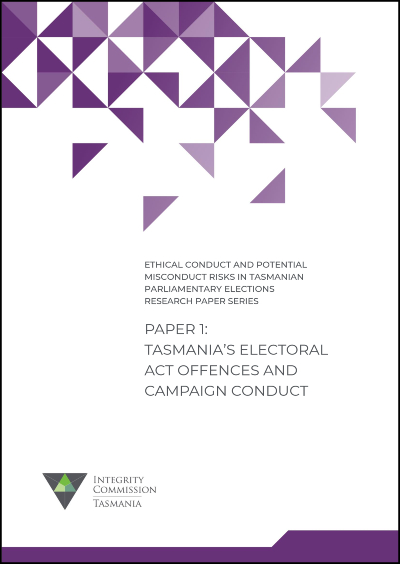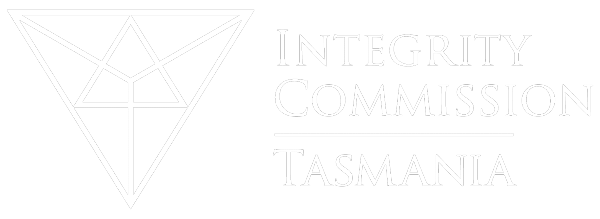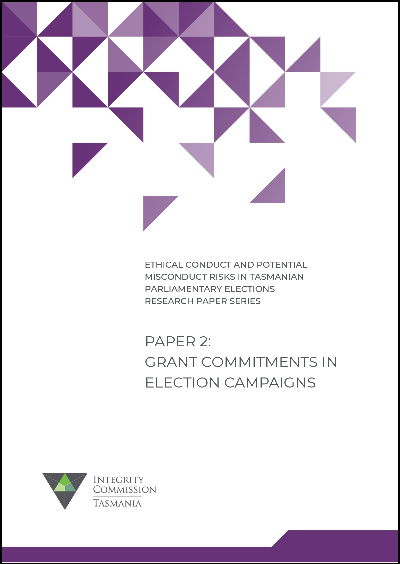Introduction
We plan to release a series of research papers about ethical conduct and potential misconduct risks in Tasmanian parliamentary elections. Elections are a corner-stone of democracy, and it is essential that the public have trust that elections are carried out ethically and without suspicion.
We have identified the risks discussed in these papers through various means, including:
- assessments and investigations completed by us and other integrity entities
- research into open source information, including information from other jurisdictions, and
- communications to the Commission.
The primary objective of these papers is to ensure that the ethical conduct and potential misconduct risks we have identified are communicated to the public. Our aim is to promote discussion about the issues and potential solutions, so that we can help to ensure that there is to adherence to acceptable standards of conduct, propriety and ethics in public authorities, particularly in relation to parliamentary elections.
The papers draw upon work that was undertaken into the 2018 Tasmanian House of Assembly election, an investigation that ultimately was not finalised by the Board of the Commission. That matter was to focus on policies, practices and procedures under which funding is provided to community groups, including possible conduct or systemic issues concerning the scale of election commitments and whether the processes for determining recipients were sufficiently transparent.
That matter also was to consider the existing powers of the Tasmanian Electoral Commissioner, and whether the Electoral Commissioner should have additional powers. We attached a draft version of Paper 1 to our submission on the bills arising from the Government's review of the Tasmanian Electoral Act.
The series commenced with the release of Paper 1 in October 2021, followed by Paper 2 in April 2022. In 2023, we are working on a third paper which addresses misconduct risks associated with the use/misuse of public resources during campaign periods. The research will consider the potential impact on government service provision and electoral competition when publicly funded resources – such as staff, communications and infrastructure – are appropriated for electioneering purposes. In so doing, we seek to demonstrate how such use/misuse of public resources could harm the public interest and undermine the democratic process.
Description
'Indirect electoral bribery' as a risk to ethical conduct, and the powers of the Tasmanian Electoral Commissioner under the Tasmanian Electoral Act.

Summary
This is the first paper in the series. This paper is about whether and how we should deal with the practice of ‘indirect electoral bribery’ – colloquially known as ‘pork-barrelling’ – in Tasmanian parliamentary elections.
As traditional vote buying has become less culturally acceptable or effective, in many parts of the world electoral candidates have moved towards a more indirect form of electoral bribery. Modern commentary around elections frequently refers to commitments made by candidates as ‘bribery’. This indirect electoral bribery is the promise or giving of a benefit to a small or localised group of electors to ‘buy’ their vote. Academic commentators have also referred to it as ‘metaphorical electoral bribery’ and ‘wholesale electoral bribery’.
Indirect electoral bribery is rarely criminal, and would not usually amount to misconduct. Nonetheless, it poses a significant threat to public confidence in government. It is also questionable conduct from an ethical perspective, if not a legal one.
Closely related to this issue is the process of making individual small-scale grant commitments during an election campaign period, which we intend to deal with in a subsequent paper.
Useful links:
- Richard Hasen, ‘Vote Buying’ (2000) 88(5) California Law Review 1323
Related content: Media release
Description
During parliamentary elections, parties and candidates often use the word ‘grant’ as a term for financial commitments or promises to achieve policy outcomes, if that party is elected. These commitments pose a risk to ethical conduct if not administered according to good practice.
Summary
This is the second paper in the series. This paper considers ways to regulate ‘commitments’ made before Tasmanian parliamentary elections and ‘grants’ provided after elections.
A fundamental tenet of our democracy is that public money should be administered responsibly by elected officials. This requires probity in the use of public funds, including in the distribution of grant money – regardless of whether the grant was a campaign commitment.
This paper examines examples of previous election funding commitments made in Tasmania and recommends that rules and legislation be implemented to ensure future election commitments are formulated and administered according to good practice.
Useful links:
Commonwealth
Tasmania
Related content: Media release


